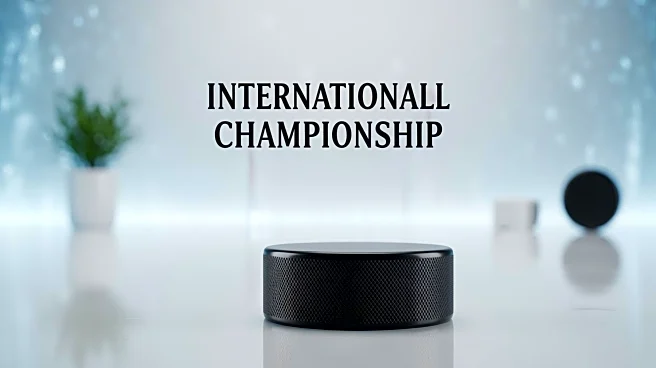What's Happening?
The 2026 IIHF World Junior Championship is set to commence on December 26, 2025, in St. Paul and Minneapolis, Minnesota. The United States, the two-time defending champion, will face Germany in one of
the four games scheduled for the opening day. The tournament will run until January 5, 2026, with games hosted at the Grand Casino Arena and 3M Arena at Mariucci. The U.S. team, which has won the championship seven times, is part of Group A alongside Sweden, Slovakia, Switzerland, and Germany. Meanwhile, Canada, which has faced quarterfinal exits in the past two years, will compete in Group B against Finland, Czechia, Latvia, and Denmark. Russia remains banned from international play due to its invasion of Ukraine. The top four teams from each group will advance to the quarterfinals on January 2, followed by the semifinals on January 4, and the championship game on January 5.
Why It's Important?
The World Junior Championship is a significant event in the international hockey calendar, showcasing young talent and providing a platform for future stars of the sport. The United States' participation as the defending champion highlights its growing prominence in international hockey. Hosting the tournament in Minnesota, a state with a rich hockey tradition, underscores the sport's cultural significance in the region. The exclusion of Russia due to geopolitical tensions reflects the intersection of sports and international relations. The tournament's outcome could influence the rankings and future prospects of the participating teams, impacting player development and national team strategies.
What's Next?
As the tournament progresses, teams will vie for a spot in the quarterfinals, with the top four from each group advancing. The semifinals and championship games will determine the ultimate winner, potentially affecting team dynamics and player careers. Stakeholders, including national hockey federations and scouts, will closely monitor performances for talent identification and strategic planning. The event may also prompt discussions on the geopolitical implications of Russia's continued exclusion from international play, influencing future policy decisions in sports governance.
Beyond the Headlines
The World Junior Championship serves as a microcosm of broader cultural and geopolitical dynamics. The exclusion of Russia highlights ongoing international tensions, while the event itself fosters cross-cultural exchanges and sports diplomacy. The tournament's impact extends beyond the ice, influencing youth engagement in hockey and contributing to the sport's global growth. Additionally, the championship provides economic benefits to the host cities through tourism and local business engagement.











